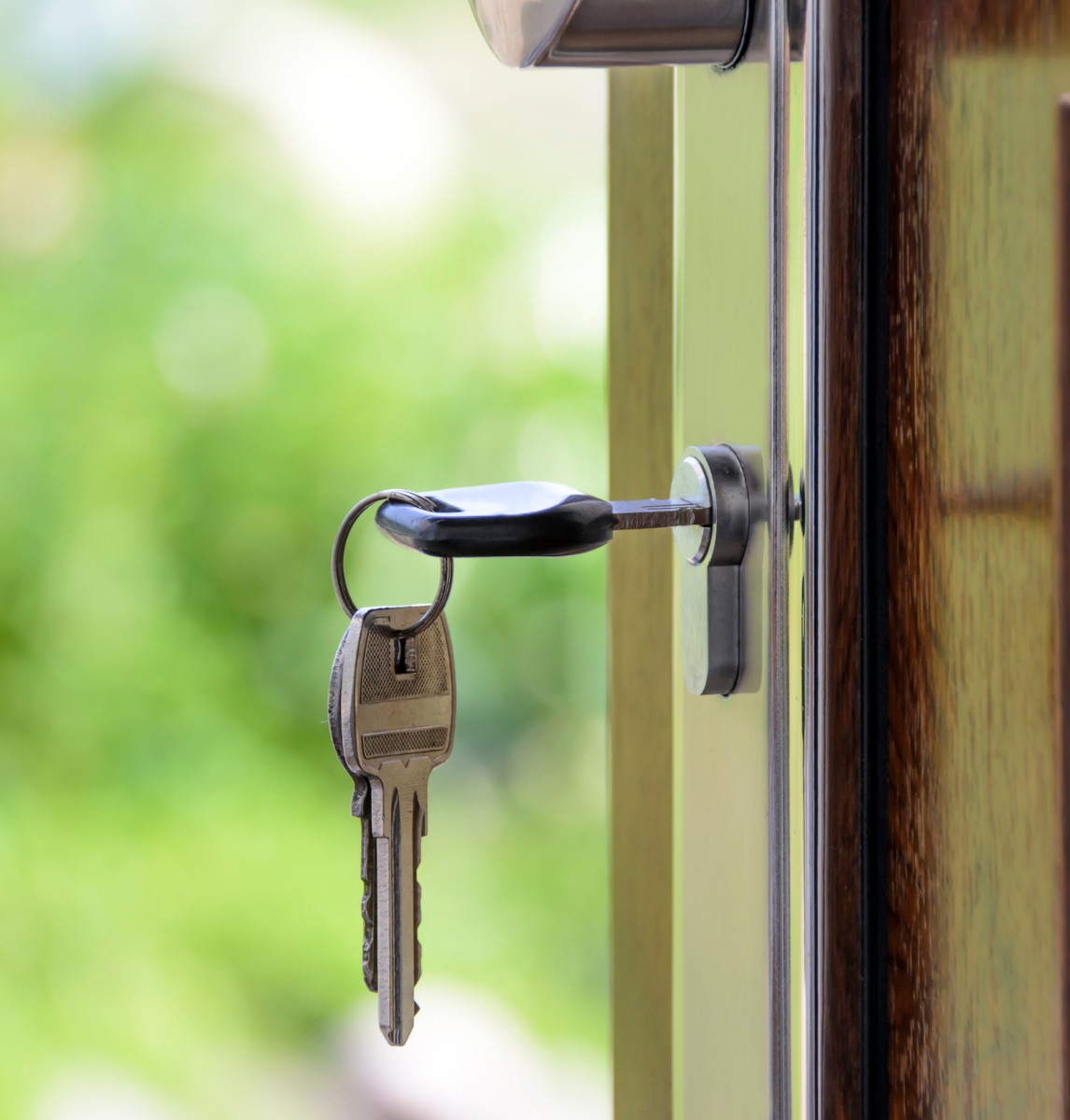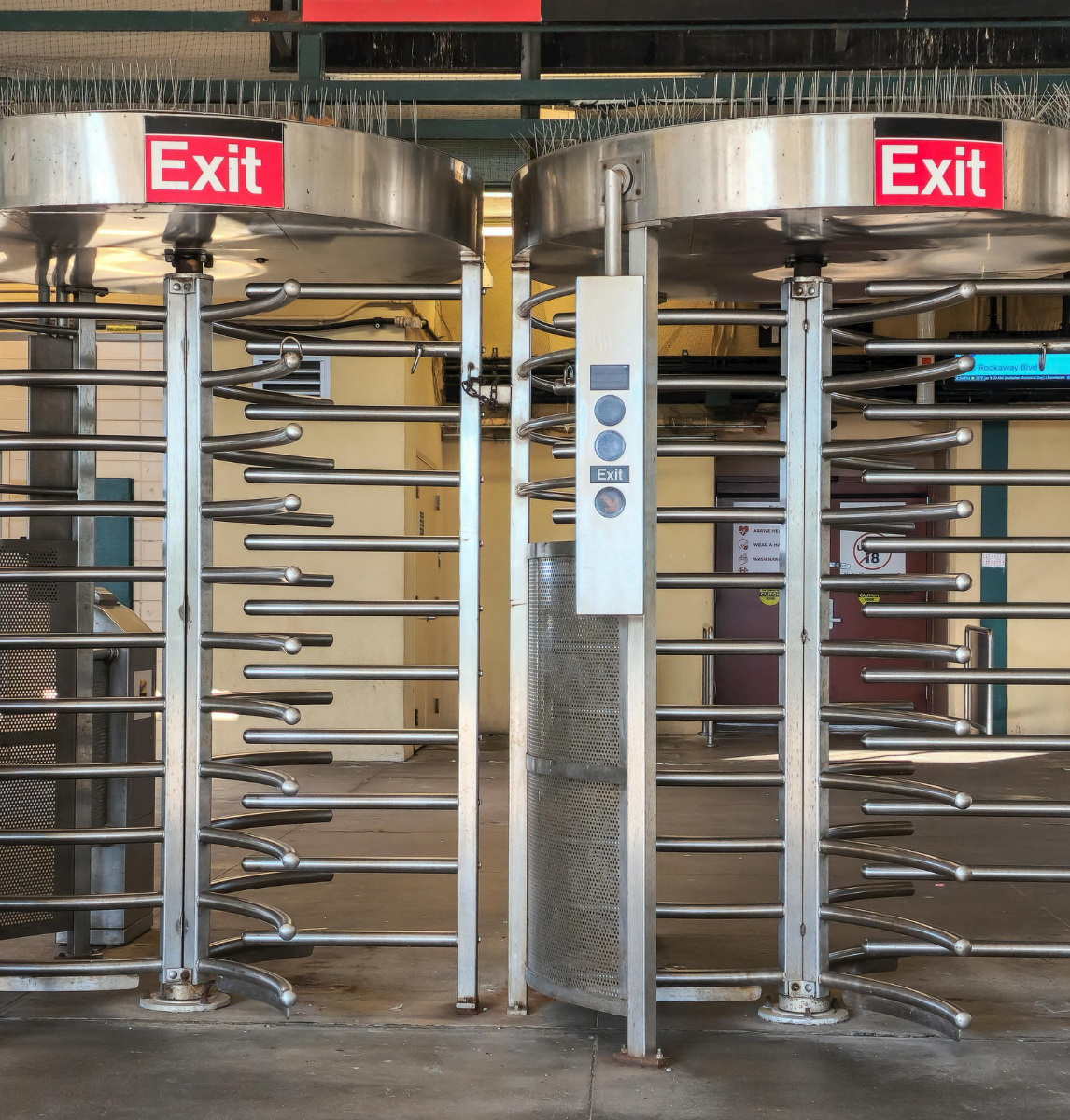How Secure Are Electronic Door Locks?
Electronic door locks and their security - read the most important information here.

Electronic access systems are on everyone's lips – they are considered the modern variant of building security and are very popular in the private and commercial sectors. But how secure are electronic door locks really? And what do you need to consider when it comes to electronic locking systems in order to achieve a high level of security ? We at BlueID have the answer for you.
Electric door locks: functions for more security
Electronic door locks are intended to simplify the opening of doors, as other access media are used instead of conventional keys. RFID chips or so-called transponders are usually used. These are issued in the form of key fobs, access cards or wristbands to users who can open doors through contact between the reader on the door and the RFID chip. There are also systems where you can gain access via an app.
So, the difference with mechanical locks is that there are electronic components that control the opening mechanism. The chip or transponder communicates with the reader and transmits information so that it opens the door or keeps it locked if it is not authorized.
Because each door and chip can be added to the system individually, electronic door locks are considered safe and practical. Each user receives individual authorizations so that no unauthorized access to premises can take place.
There are the following ways to gain access to an electronic door:
- Bluetooth: The smartphone is used to establish a Bluetooth connection to a reader on the door. The lock can be easily opened. Access codes can be managed individually and can also be temporarily restricted.
- RFID: A special chip or transponder is held against the lock to open it. Access rights can be adjusted quickly and easily.
- Biometric features: Some electronic door locks can be opened with a pre-registered fingerprint or iris scan.
- Numerical code: A specific, pre-programmed code is entered via a keyboard.
Electronic locking systems have one thing in common: they make a physical key superfluous.
Although the security aspect plays a major role in electronic locking systems, many users keep asking themselves the question: How secure are electronic door locks really? And what is important in terms of security?
What is an electronic door lock?
An electronic door lock is a digital locking system that opens doors without a traditional key — for example, via app, keypad, fingerprint, or key card. It offers greater control and security through individually manageable access rights and logging functions.
An electronic door lock replaces mechanical cylinders with digital access methods and is suitable for both private and commercial use. It offers the following advantages:
- Digital access control: Entry via smartphone, code, fingerprint, or transponder
- Enhanced security: Encrypted communication and tamper-resistant technology
- Centralized management: Access rights can be individually assigned and time-limited
- Access logs: All openings can be recorded and traced
- Everyday flexibility: Ideal for apartment buildings, offices, or public institutions
What is a keyless door lock?
A keyless door lock allows access without a physical key — for example, via Bluetooth, app, or fingerprint. It increases convenience and protects against lost keys or unauthorized duplication.
A keyless door lock operates contactlessly and digitally. Especially in smart home or business settings, it offers greater comfort and control. Its key features include:
- Keyless access: Unlock via app, chip, fingerprint, or NFC
- No more lost keys: Eliminates security risks from lost or copied keys
- Flexible access management: Access rights can be granted or revoked at any time
- Ideal for changing users: Especially useful for vacation rentals, offices, or shared households
- Smart home compatibility: Can be integrated into modern building systems
Are electronic door locks more secure than mechanical ones?
One of the great advantages of electronic door locks is security. In addition, there is a high degree of flexibility, the logging of accesses and the high level of convenience. Digital keys are easy to manage, so permissions can be revoked or extended at any time.
A special feature of electronic door locks in terms of security is that in the event of a loss of keys, a complete replacement is no longer necessary. Rather, the lost transponder or chip can simply be blocked, which does not entail any time delay or high costs.
In addition, building owners know at all times which key was used to open which lock and when. This increases security once again.
The fact is that modern solutions such as electronic door locks are often considered more secure than conventional, mechanical systems. After all, locks can no longer be picked here. But how secure are electronic door locks really? There are a few risks that should be considered.
Vulnerabilities and Risks: Security Problems with Electronic Door Locks
Electronic door locks are uncrackable, but not hackable. Modern solutions provide modern vulnerabilities – after all, criminals and their scams are also constantly evolving. However, security also means that users have access to their premises at all times. The following potential vulnerabilities and risks are associated with electronic locking systems:
- Hacking: Criminals know what they'redoing. Some specialize in hacking and could gain unauthorized access if the system is not appropriately secured. Since many assume that their smart locks are safe without further ado, this vulnerability is often overlooked and unfortunately exploited accordingly. Particularly low-quality productsoffer security gaps that can be quickly detected by hackers.
- Radio interference and signal loss: Radio-based systems that work with Bluetooth, for example, can be affected by range problems, signal interference or battery shortages. Access is temporarily not available.
- Power outages and battery problems: If the power goes out or the batteries run out, the lock won't open.
- Loss of access data: As with a conventional lock, if you lose your key, you no longer have access.
- Manipulation: Electronic locks, like mechanical locks, are victims of break-in attempts, destruction or sabotage.
This shows that even electronic access solutions are not immune to dangers.
Avoid risks: more security with electric door locks
Electronic door locks can be more secure than mechanical ones. This always depends heavily on what kind of system is chosen. An electronic locking system should have the following security features:
- Encryption: State-of-the-art standards that stand for security and reliability are a must for all electronic and automatic locks.
- Tamper and sabotage protection:Many manufacturers now offer targeted protection against manipulation and sabotage. This is also strongly recommended to protect yourself from unauthorized access.
- Monitoring and alarm functions:Only if a locking system can be monitored and controlled can you know what's going on, who is in the building and whether there is any suspicious activity. With an alarm function, building owners protect themselves to a special degree.
- Backup power supply and emergency opening options: If the batteries run out or the power fails, there must still be away to gain access.
- Regular software updates: Systems can only be secure in the long term if they are regularly updated and maintained. Therefore, manufacturers should provide regular updates.
So, when asked how secure electronic door locks are, you can answer: the more security features a lock has, the more secure it is. Then electronic variants also surpass mechanical systems.
How secure are electronic door locks really?
Electronic door locks are secure, when properly selected and professionally installed. In office buildings, apartment complexes, schools, and childcare centers, they enhance security through modern technologies like encryption and access management, provided certified systems such as those from BlueID are used.
Key advantages at a glance:
- Individual access control: Permissions can be precisely assigned, time-limited, and adjusted at any time
- High tamper resistance: Systems with modern encryption protect against hacking and data theft
- Access logs: Every entry can be tracked, ensuring transparency and traceability
- No more lost keys: Keyless access via app, chip, or fingerprint increases convenience and reduces security risks
- Tailored security solutions: Providers like BlueID offer systems customized to specific building types and user needs
Electronic door locks are not only convenient but also secure, if you rely on certified technology and experienced providers. This makes digital access control a reliable solution for modern buildings.
Conclusion
Electronic locking systems and door locks are quite popular. But how secure are electronic door locks? It turns out that it depends on the system and its security features. If you want to be on the safe side, you should contact a professional who knows what is important in terms of security. We at BlueID are happy to provide secure access solutions for private and commercial use.





